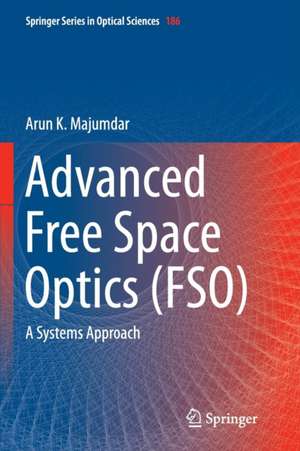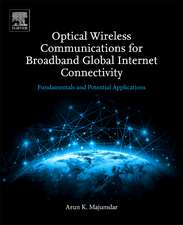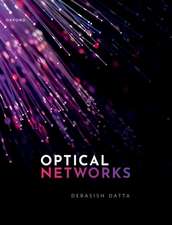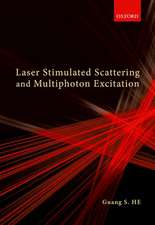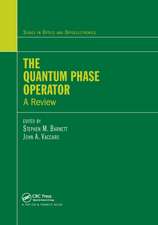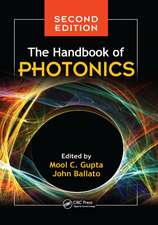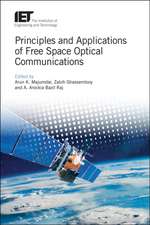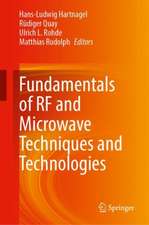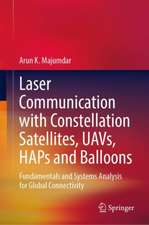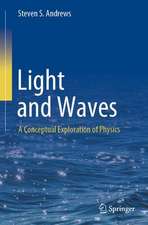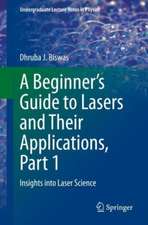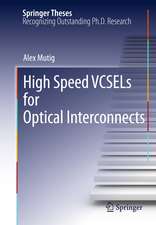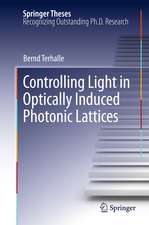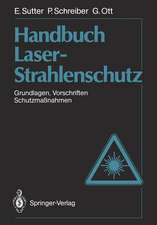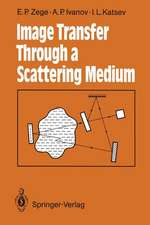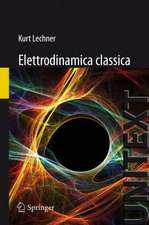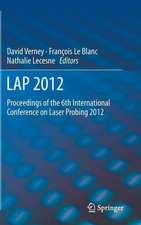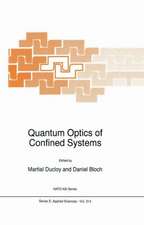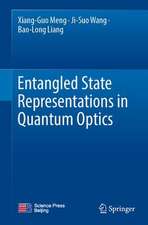Advanced Free Space Optics (FSO): A Systems Approach: Springer Series in Optical Sciences, cartea 186
Autor Arun K. Majumdaren Limba Engleză Paperback – 10 sep 2016
FSO communication is a practical solution for creating a three dimensional global broadband communications grid, offering bandwidths far beyond what is possible in the Radio Frequency (RF) range. However, the attributes of atmospheric turbulence and scattering impose perennial limitations on availability and reliability of FSO links. From a systems point-of-view, this groundbreaking book provides a thorough understanding of channel behavior, which can be used to design and evaluate optimum transmission techniques that operate under realistic atmospheric conditions.
Topics addressed include:
• FSO Physical and Statistical Models: Single/Multiple Inputs/Outputs
• Understanding FSO: Theory and Systems Analysis
• Modulation and Coding for Free-Space Optical Channels
• Atmospheric Mitigation and Compensation for FSO Links
• Non-line-of-sight (NLOS) Ultraviolet and Indoor FSO Communications
• FSO Platforms: UAV and Mobile
• Retromodulators for Free Space Data links
• Hybrid Optical RF Communications
• Free-space and Atmospheric Quantum Communications
• Other related topics: Chaos-based and Terahertz (THz) FSO Communications
| Toate formatele și edițiile | Preț | Express |
|---|---|---|
| Paperback (1) | 934.19 lei 6-8 săpt. | |
| Springer – 10 sep 2016 | 934.19 lei 6-8 săpt. | |
| Hardback (1) | 940.20 lei 6-8 săpt. | |
| Springer – 11 sep 2014 | 940.20 lei 6-8 săpt. |
Din seria Springer Series in Optical Sciences
- 24%
 Preț: 945.45 lei
Preț: 945.45 lei - 18%
 Preț: 1818.90 lei
Preț: 1818.90 lei - 18%
 Preț: 2088.12 lei
Preț: 2088.12 lei - 20%
 Preț: 568.46 lei
Preț: 568.46 lei - 18%
 Preț: 1100.04 lei
Preț: 1100.04 lei - 18%
 Preț: 982.87 lei
Preț: 982.87 lei - 18%
 Preț: 941.47 lei
Preț: 941.47 lei - 18%
 Preț: 877.05 lei
Preț: 877.05 lei -
 Preț: 276.15 lei
Preț: 276.15 lei - 15%
 Preț: 637.63 lei
Preț: 637.63 lei - 18%
 Preț: 1806.98 lei
Preț: 1806.98 lei -
 Preț: 373.51 lei
Preț: 373.51 lei - 18%
 Preț: 1369.41 lei
Preț: 1369.41 lei - 18%
 Preț: 1212.08 lei
Preț: 1212.08 lei - 18%
 Preț: 1542.43 lei
Preț: 1542.43 lei - 18%
 Preț: 2060.05 lei
Preț: 2060.05 lei - 18%
 Preț: 1207.10 lei
Preț: 1207.10 lei - 15%
 Preț: 632.81 lei
Preț: 632.81 lei - 18%
 Preț: 938.35 lei
Preț: 938.35 lei - 18%
 Preț: 931.38 lei
Preț: 931.38 lei - 18%
 Preț: 1220.58 lei
Preț: 1220.58 lei - 18%
 Preț: 931.06 lei
Preț: 931.06 lei -
 Preț: 385.64 lei
Preț: 385.64 lei - 18%
 Preț: 980.70 lei
Preț: 980.70 lei - 18%
 Preț: 1535.90 lei
Preț: 1535.90 lei - 18%
 Preț: 1091.50 lei
Preț: 1091.50 lei - 15%
 Preț: 640.23 lei
Preț: 640.23 lei -
 Preț: 407.75 lei
Preț: 407.75 lei - 18%
 Preț: 936.51 lei
Preț: 936.51 lei - 15%
 Preț: 630.23 lei
Preț: 630.23 lei
Preț: 934.19 lei
Preț vechi: 1139.25 lei
-18% Nou
Puncte Express: 1401
Preț estimativ în valută:
178.87€ • 186.26$ • 148.41£
178.87€ • 186.26$ • 148.41£
Carte tipărită la comandă
Livrare economică 14-28 februarie
Preluare comenzi: 021 569.72.76
Specificații
ISBN-13: 9781493952748
ISBN-10: 1493952749
Pagini: 412
Ilustrații: XV, 397 p. 149 illus., 101 illus. in color.
Dimensiuni: 155 x 235 x 22 mm
Greutate: 0.58 kg
Ediția:Softcover reprint of the original 1st ed. 2015
Editura: Springer
Colecția Springer
Seria Springer Series in Optical Sciences
Locul publicării:New York, NY, United States
ISBN-10: 1493952749
Pagini: 412
Ilustrații: XV, 397 p. 149 illus., 101 illus. in color.
Dimensiuni: 155 x 235 x 22 mm
Greutate: 0.58 kg
Ediția:Softcover reprint of the original 1st ed. 2015
Editura: Springer
Colecția Springer
Seria Springer Series in Optical Sciences
Locul publicării:New York, NY, United States
Cuprins
Chapter 1 Fundamentals of FSO Communication System.- 1.1 Introduction.- 1.2 What is information and how do we measure it?.- 1.3 Bandwidth: Know the Data Transmission Rates and What you Need!.- 1.4 How the Data Transmission Rates are provided in Today’s Networks.- 1.5 Basics of Optical Networks relevant to FSO Communications.- 1.6 Free-Space Optical Connectivity in Today’s Networks.- 1.7 Optical Networks: Integration of FSO.- 1.8 Free-Space-Optical (FSO) Mobile Ad-Hoc Networks (MANET).- 1.9 Underwater Free-space-Optical ( FSO) Communications Network.- 1.10 Indoor FSO communications.- Chapter 2 Theory of FSO Communication Signal Propagation through Atmospheric Channel.- 2.1 Statistical description of Random Processes and Random Fields.- 2.2 FSO communications in presence of Atmosphere.- 2.3 Theory of Optical propagation through atmospheric turbulence relevant to FSO optical communications.- 2.4 FSO communication signal temporal frequency spectrum.- 2.5 Probability Density Function (PDF) models for Intensity fluctuations relevant to FSO communication systems.- 2.6 Reconstruction of Probability Density Function of Intensity fluctuations relevant FSO communications through atmospheric turbulence.- Chapter 3 Modulation, Detection and coding for FSO communications.- 3.1 Digital Communications System: Modulation and Demodulation .- 3.2 FSO Communication Channel Models.- 3.3 Modulation Schemes in FSO Communications.- 3.4 Channel Capacity and Coding for FSO Communications.- Chapter 4 Mitigation Techniques for improved FSO Communications.- 4.1 Aperture Averaging.- 4.2 Diversity Technique.- Chapter 5. Non-line-of-sight (NLOS) Ultraviolet and Indoor FSO communications.- 5.1 Ultraviolet Communications.- 5.2 NLOS FSO communications configurations and UV Source and Detector Technologies.- 5.3 Indoor FSO communications .- Chapter 6 FSO Platforms: UAV and Mobile.- 6.1 Unmanned Aerial Vehicle (UAV) Free Space Optical Communications.- 6.2 Mobile Free Space OpticalCommunications.- 7. Other Related Topics: Chaos-based and Terahertz (THz) FSO Communications.- 7.1 Chaos-based FSO Communications.- 7.2 Terahertz (THz) FSO Communications.- Chapter 8 Modulating Retro-Reflector-based FSO Communications.- 8.1. Introduction and Background.- 8.2. Description of Modulating retro-reflector Free-Space Optical Communications System .- 8.3. Modulating Retro-reflector Technologies .- 8.4. MRR-based FSO Communications Systems Performance Analysis.- 8.5. Applications.- CHAPTER 9 Hybrid Optical/RF Communications.- 9.1 Introduction.- 9.2 Hybrid Optical/RF Communications.- 9.3 FREE SPACE OPTICAL COMMUNICATION SYSTEMS.- 9.4 RF Communications System.- 9.5 Network System.- CHAPTER 10. Free-Space and Atmospheric Quantum Communications.- 10.1 Introduction to Free-Space and Atmospheric Quantum Communications.- 10.2 Fundamentals for Free-Space Quantum Communications .- 10.3 Free-Space and Atmospheric Quantum Communications Experiments.
Notă biografică
Dr. Arun K. Majumdar is a research scientist and a former university professor. In the past he has worked in optical communications and research industries for over 28 years, was the Director of Research at LCResearch, Inc. in California. He served as a full Professor at the University of Colorado for five years, and served as a Visiting Professor at both NIST and at the Brno University of Technology in the Czech Republic. Dr. Majumdar is a Springer book author and has published over 50 peer-reviewed articles, has written over 25 technical reports, and has given over 40 conference presentations. He is a member of IEEE, OSA, and SPIE.
Textul de pe ultima copertă
This book provides a comprehensive, unified tutorial covering the most recent advances in the technology of free-space optics (FSO). It is an all-inclusive source of information on the fundamentals of FSO as well as up-to-date information on the state-of-the-art in technologies available today. This text is intended for graduate students, and will also be useful for research scientists and engineers with an interest in the field.
FSO communication is a practical solution for creating a three dimensional global broadband communications grid, offering bandwidths far beyond what is possible in the Radio Frequency (RF) range. However, the attributes of atmospheric turbulence and scattering impose perennial limitations on availability and reliability of FSO links. From a systems point-of-view, this groundbreaking book provides a thorough understanding of channel behavior, which can be used to design and evaluate optimum transmission techniques that operate under realistic atmospheric conditions.
Topics addressed include:
• FSO Physical and Statistical Models: Single/Multiple Inputs/Outputs
• Understanding FSO: Theory and Systems Analysis
• Modulation and Coding for Free-Space Optical Channels
• Atmospheric Mitigation and Compensation for FSO Links
• Non-line-of-sight (NLOS) Ultraviolet and Indoor FSO Communications
• FSO Platforms: UAV and Mobile
• Retromodulators for Free Space Data links
• Hybrid Optical RF Communications
• Free-space and Atmospheric Quantum Communications
• Other related topics: Chaos-based and Terahertz (THz) FSO Communications
FSO communication is a practical solution for creating a three dimensional global broadband communications grid, offering bandwidths far beyond what is possible in the Radio Frequency (RF) range. However, the attributes of atmospheric turbulence and scattering impose perennial limitations on availability and reliability of FSO links. From a systems point-of-view, this groundbreaking book provides a thorough understanding of channel behavior, which can be used to design and evaluate optimum transmission techniques that operate under realistic atmospheric conditions.
Topics addressed include:
• FSO Physical and Statistical Models: Single/Multiple Inputs/Outputs
• Understanding FSO: Theory and Systems Analysis
• Modulation and Coding for Free-Space Optical Channels
• Atmospheric Mitigation and Compensation for FSO Links
• Non-line-of-sight (NLOS) Ultraviolet and Indoor FSO Communications
• FSO Platforms: UAV and Mobile
• Retromodulators for Free Space Data links
• Hybrid Optical RF Communications
• Free-space and Atmospheric Quantum Communications
• Other related topics: Chaos-based and Terahertz (THz) FSO Communications
Caracteristici
A solid introduction to Free Space Optics for graduate students and for professionals new to the field Numerical examples for different applications are provided to help the readers design their own systems Each chapter contains a section on fundamentals (with necessary derivations of the equations), theory of operation and recent developments with examples Includes three co-written chapters giving case studies of advanced techniques with practical examples Includes supplementary material: sn.pub/extras
